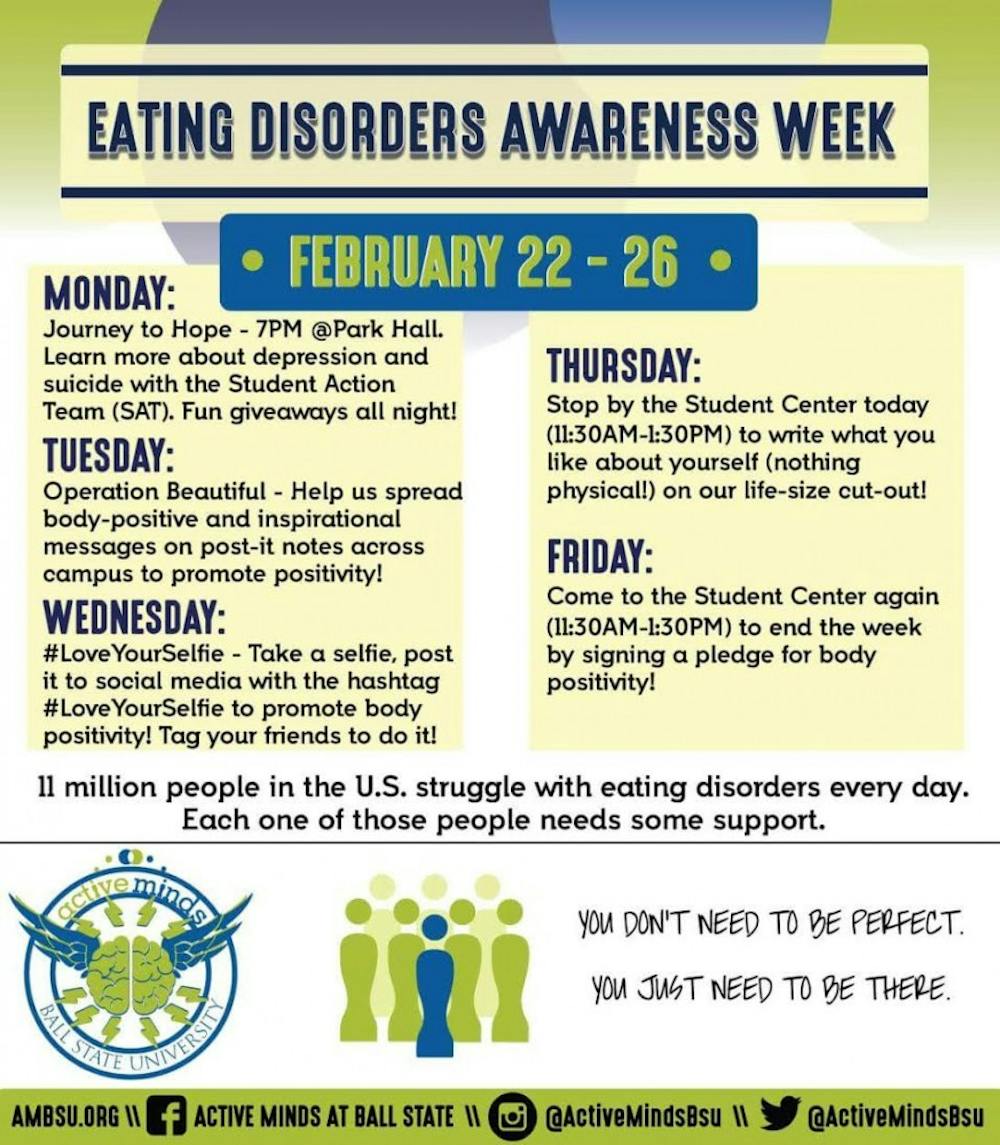11 million people in the country struggle with eating disorders every day, according to Eating Disorder Hope.
Lucas said these statistics will keep growing unless education and awareness increases. The Counseling Center and Active Minds are hosting events for National Eating Disorder Awareness Week from Feb. 22-27.
In the United States, 20 million women and 10 million men will suffer from a clinically significant eating disorder at some time in their life, according to the National Eating Disorder Association.
Though the numbers are high, the National Eating Disorder Association said only one in 10 men and women with eating disorders receive treatment, even though these disorders have the highest mortality rate of mental illnesses.
“There are a lot of things that spark eating disorders, but I think it comes down to the idea of thinness and what is accepted as perfect,” Lucas said. “Our society focuses on weight and appearance and associates that with success in our lives, which can be very dangerous.”
When a person focuses on their weight, they may turn to extreme dieting that triggers an eating disorder such as anorexia, where people have an occupation with food, calorie counting and starvation.
Katie Rider, a second-year doctoral student in counseling psychology, said along with dieting, it's a combination of multiple reasons other than the culture that contributes to eating disorders — like biological and genetic components, and psychological and environmental factors.
“It really depends on the disorder and person," Rider said.
People struggling with eating disorders may feel like they are in control of their body, but the disorders are not by choice or controllable.
“One of the biggest misconceptions is that you can tell just by looking at someone if they have an eating disorder,” Lucas said. “People who are normal body weight or over weight can have an eating disorder. People can have a disorder at any weight. If you are restricting or purging to get rid of food, then you have an issue there. It’s important to understand that there are a variety of body types and everyone is built differently, so you can’t say there is a look to having an eating disorder.”
Misconceptions can lead to stigmas, making it difficult for some individuals to seek treatment and often making it less likely that medical professionals will identify or diagnose eating disorders when they occur outside of the stereotypes, according to The Center for Eating Disorders at Sheppard Pratt.
Those struggling with eating disorders struggle with several signs and symptoms that can be physical and psychological, such as constant weight fluctuations, engaging in ritualistic eating patterns such as cutting food into tiny pieces or hiding food, a continued fixation of food, avoidance of social functions, isolation and depression, according to eatingdisorderhope.com.
The most important thing a person with an eating disorder can do is seek treatment and recovery, even though it can be extremely difficult, said Julie Matsen, a first-year doctoral student in counseling psychology.
“Although over 30 million people struggle with a clinically significant eating disorder at some point in their lives, many who struggle are ashamed to talk about them and seek treatment, while those who don’t struggle are afraid to approach the topic with loved ones,” Matsen said. “They are paralyzed by fear and unsure how to take the first step to speak up about mental health.”
An eating disorder is nothing you can overcome alone, Rider said.
“Out of all the other mental illnesses, I would argue that an eating disorder is the most difficult to treat,” Rider said. “It begins by admitting you have a problem and then reaching for help. The earlier the treatment, the better."
Ball State works with students who are working on recovering from eating disorders, and the Counseling Center offers individual and group counseling, as well as support groups for students.
“We see students from all sorts of stages of recovery," Lucas said. “What we offer is also prevention to talk about healthy eating and weight."
Lucas said the week of awareness is important to spread awareness and education to the public on such a serious issue.
“Eating disorders are very serious, with one of the highest rates being among college students,” Lucas said. “While we have this week to educate and bring awareness to the public, we need to be constantly combating messages within our society on dieting and weight loss and start promoting positive, alternative messages.”
11 million people in the country struggle with eating disorders every day, according to Eating Disorder Hope.





